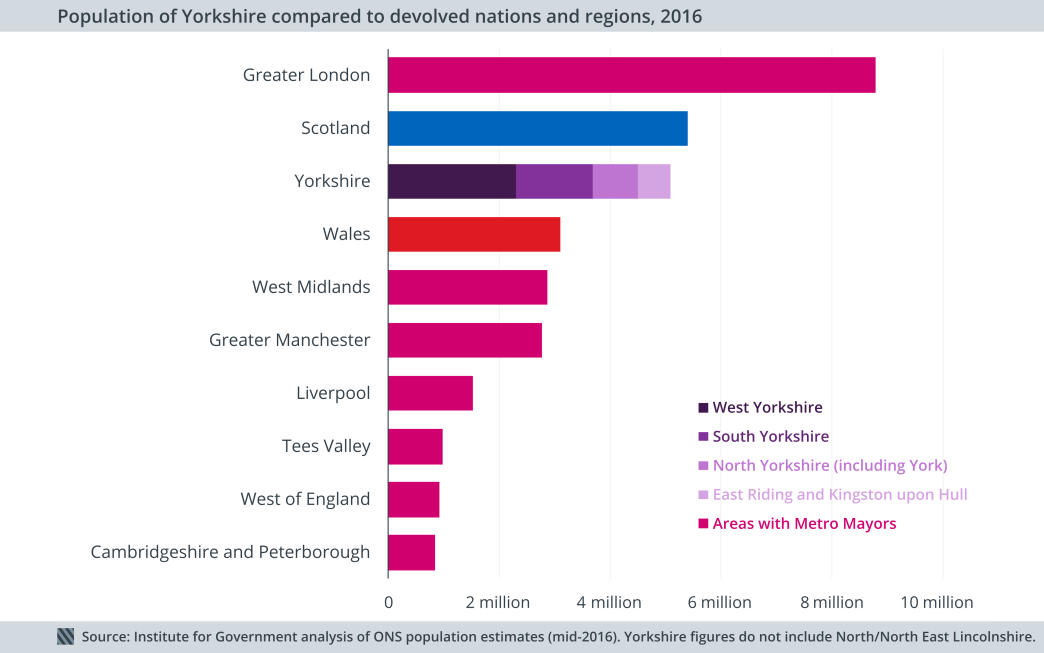Where next for Yorkshire devolution?
Devolution in Yorkshire needs to take a step forward
This May, metro mayors were elected in six English city-regions, but Yorkshire missed out on this latest wave of devolution. Jack Kellam and Akash Paun say that next time round, devolution in the county needs to take a step forward.
How Yorkshire became the hole in the Northern Powerhouse
The Institute for Government (in partnership with the British Academy) has previously outlined how Yorkshire became the “hole in the Northern Powerhouse”. While Liverpool, Manchester and the Tees Valley signed off devolution deals and elected new metro mayors in May, Yorkshire missed the boat. The only agreed deal – for the Sheffield City Region (SCR) – was postponed, after a judicial review ruled that there had been insufficient public consultation.
The expectation was that the SCR deal would go ahead a year behind schedule, with a mayor elected in May 2018. But that has been called into question after the withdrawal of four of the six constituent councils – Barnsley, Doncaster, Chesterfield and Bassetlaw – leaving only Sheffield and Rotherham on board. The leaders of Barnsley and Doncaster councils now favour a One Yorkshire devolution settlement: a single deal encompassing the entire historic county. They intend to hold a postal ballot asking local residents to choose between the two alternative models.
What could a One Yorkshire devolution deal look like?
The One Yorkshire idea is not a new one, but limited progress has been made due to the absence of agreement across the county and the limited interest central government has shown. However, in August, on Yorkshire Day, 17 of the 20 council leaders across the county committed in principle to pursue the One Yorkshire model. They also reached agreement on two key points.
First, that a One Yorkshire deal would be based on the mayoral combined authority governance model. This is the Government’s preferred option, but it had previously been a major point of contention at the local level, hampering agreement on a West Yorkshire deal based on the Leeds City Region as well as earlier discussions about a county-wide deal.
Second, the powers devolved should be "ambitious", which seems to mean at least equal to those devolved to the six metro mayors elected in May. This would imply devolution of powers in areas such as skills, planning, transport and health. Yorkshire’s population of 5.4 million means that a new mayor for the county would have the biggest personal mandate outside London, so such a proposal is to be expected and appears justified.
A mayor for Yorkshire would have the largest personal mandate outside London

Has the Government killed the One Yorkshire vision?
The One Yorkshire idea has support from senior opposition politicians in Westminster. Labour MP for Barnsley Dan Jarvis argues that “the more financial and regulatory power” devolved, “the better”. Public interventions in support of a One Yorkshire deal by other senior Labour figures, including the Doncaster MPs Caroline Flint, Ed Miliband and Rosie Winterton, have further raised the project’s profile.
However, the Government's attitude is still one major obstacle to progress. Since George Osborne’s departure as Chancellor, devolution has fallen down the policy priority list. As far as Yorkshire is concerned, the messages from Whitehall have been mixed at best, but it now seems clear that there is little support for an ambitious new county-wide deal.
In September, Chancellor Philip Hammond hinted that a wider One Yorkshire deal was possible, but that it would “definitely need Leeds and Sheffield at the table”. However days later, Sajid Javid, Secretary of State for Communities and Local Government, wrote to local stakeholders ruling out “any proposal for a Yorkshire wide deal that… [involves] one or more of the four South Yorkshire councils”.
In October, Jake Berry, the minister responsible for the Northern Powerhouse, insisted that “the new South Yorkshire mayor" will be elected next May and that any future “Greater Yorkshire deal should not and cannot include any of the South Yorkshire boroughs”. He previously dismissed the idea of a deal for the whole county on the grounds that “devolution is about giving control to cities”, rather than to wider regions or counties.
Can the deadlock on Yorkshire devolution be broken?
As things stand, the Government remains committed to the SCR deal, despite the fact that only Sheffield and Rotherham now favour this model. By declaring that there is no alternative, however, the Government presumably intends to strong-arm Barnsley and Doncaster back into the fold.
In response, eight Conservative-led councils in North Yorkshire are now calling for an alternative Greater Yorkshire deal that would leave out South Yorkshire, on the assumption that Westminster’s hard line leaves the One Yorkshire vision dead in the water. However, Labour-led councils in West Yorkshire are not in favour of this plan. The position of Hull and East Riding councils – also part of the One Yorkshire coalition – is unclear.
All this leaves Yorkshire in deadlock. The Government is naturally preoccupied with Brexit and on staying afloat in Westminster. Devolution to Yorkshire may not strike many in SW1 as a national priority. But with mayoral authorities established elsewhere in England and already engaged in talks about the next phase of devolution, the Government should ensure that Yorkshire is not left out again.